
by
Paul Broussard
, posted 22 hours ago / 1,045 Views
Hey, Ace Attorney, didn’t see you there. What, is Papa Capcom short on cash again and decided to wring a couple of your old games out for a few more dollars? What’s it this time, yet another version of the original Phoenix Wright trilogy? Or perhaps a port of some older Japanese exclusive titles for the States? Oh, it’s the Apollo Justice trilogy? Well, at least they’re games that aren’t available on modern consoles. Don’t suppose you’ve got an actual Ace Attorney 7 for me? No? Well, worth checking anyway. No, I’m not bitter about anything.
While we’re suffering in the infinite abyss for an actual follow up to the mainline Ace Attorney series, here’s another collection of old games: Apollo Justice: Ace Attorney, Phoenix Wright: Ace Attorney – Dual Destinies, and Phoenix Wright: Ace Attorney – Spirit of Justice. These are the three mainline entries set after the original Ace Attorney trilogy.
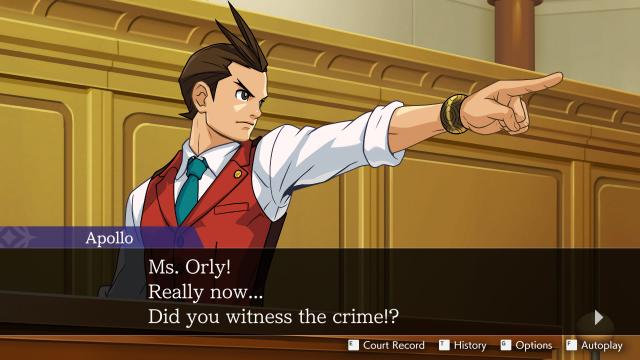
If you’re not familiar with Ace Attorney, a helpful summary is probably to say that they’re visual novels mixed with a logic game, while a less helpful one would be to say it’s the wacky lawyer game where you cross examine a parrot. You play as one of a variety of defense attorneys tasked with defending a client who has been, or shortly will be, accused of murder. Proceedings are generally split into two halves: investigations, which involve talking with suspects & witnesses, and looking for clues via a point ‘n click interface; and trial segments, where witnesses give testimony and your job is to point out the problems with said testimony. Present too many incorrect answers in a trial segment and you’ll get a game over, and your client will be found guilty.
The core gameplay hasn’t changed much since the very first title back on the Game Boy Advance, which has placed the emphasis for later entries in the series much more on the story and individual cases, rather than learning and mastering mechanics. And boy is Apollo Justice Trilogy a mixed bag on that front. Set seven years after the previous mainline entry (Trials & Tribulations), the Apollo Justice Trilogy focuses on an older Phoenix Wright and two new attorneys (Apollo Justice & Athena Cykes), as they deal with a wide variety of new cases and wacky shenanigans.
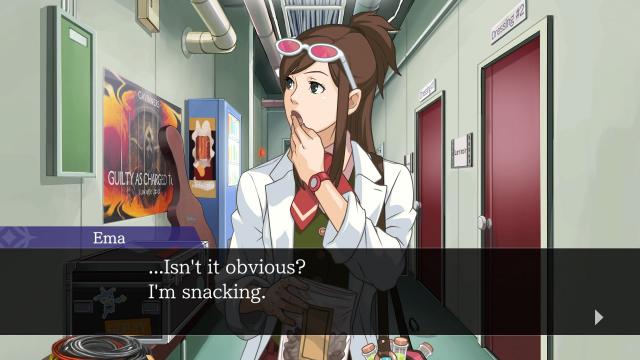
You may have already discerned from that description the first major face plant for the Apollo Justice Trilogy: despite being called the “Apollo Justice Trilogy,” Apollo is really only the main character for roughly one and a half of these games. Given that two of the titles included in this trilogy (Dual Destinies and Spirit of Justice) carry original protagonist Phoenix Wright’s name and character outline on the logo, rather than Apollo’s, the attempt to package this as an “Apollo Justice” trilogy feels like a bit of revisionist history; really there are three largely disconnected narratives operating on their own here.
By itself, that probably wouldn’t be much of an issue. After all, plenty of publishers package collections of games that aren’t especially related from a narrative standpoint. However, Ace Attorney’s heavy dependence on narrative and character development means that it relies much more heavily on story interconnectedness, and the bizarre insistence of the games included in this trilogy to refuse to acknowledge or build much upon previous titles is a massive problem for creating a story that the player can become invested in. The director of the series since 2009, Takeshi Yamazaki, has stated that he didn’t want to create a possible situation where a series newcomer would play a game and feel lost because it heavily referenced events from a prior entry. While this may be well intentioned, it absolutely cripples the writing team’s ability to develop characters and build arcs over the course of several entries. Imagine something like Mass Effect, but the characters can’t bring up events from past titles beyond surface level references. That’s the kind of handicap Ace Attorney is operating with.
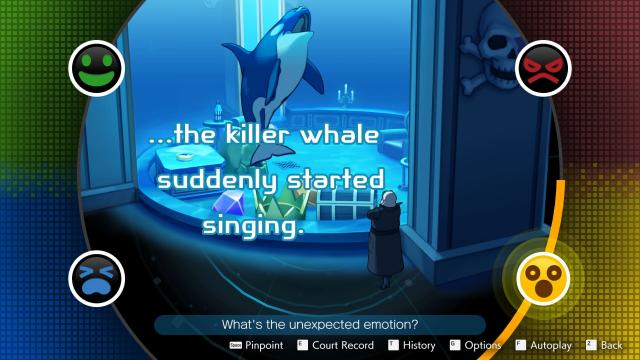
Minor spoiler warning: I’ll be throwing out some examples to illustrate that problem over the next four paragraphs, so feel free to skip ahead if you don’t want any spoilers whatsoever. Towards the end of the first title in the trilogy, it’s revealed that two prominent characters are secretly siblings, and this knowledge is being kept a secret by one of the major actors in the game’s backstory. For other, various spoiler-related reasons, this is a significant revelation with major ramifications on the future of the series. The game ends with this “actor” promising to a friend of theirs that they intend to tell the secret siblings about their relationship soon. Fast forward to the final case in the “trilogy” and, after the credits roll, the teaser at the end is the same two individuals talking about how they intend to tell the siblings soon. Two full games come and go with absolutely nothing being done with this huge cliffhanger. It’s such a frustrating way of creating stories born out of a desire to avoid creating extra backstory for people who haven’t played the first title, because in the process it makes it virtually impossible for veterans to care about any long-lasting plotlines, since they’ll likely never be resolved anyway.
Even approaching the games as self-contained entities, the narrative quality is often hit or miss. There are some absolutely thrilling and well-crafted mysteries, like the opening case in Apollo Justice, the side story case in Dual Destinies, and the second case in Spirit of Justice. But the broad, overarching stories generally fail to hit home, because they keep introducing new, often interesting ideas, but fail to adequately expound upon them or do the world building necessary to make them work.
Apollo Justice, for instance, builds up a huge amount of intrigue as to certain events which cause a major character to change dramatically, only to wait until the very last case to reveal what these events even were, at which point so much has to be crammed into such a tiny amount of space that the actual explanation winds up being laughably flimsy, with nonsensical decision-making and an abundance of plot holes. Dual Destinies talks up the “dark age of the law,” a supposed mass degradation of the ethics of the legal system, where forged evidence and cheating amongst lawyers is rampant, but fails to really show how that’s any different from the previous games, where prosecutors forged or withheld evidence basically every case, and witnesses told lies like they were trying to set a world record for perjury.
The most egregious example of this probably comes in the final case of Spirit of Justice, which is so horrifically written and designed that it retroactively taints everything that came before it, and makes me wish the game as a whole didn’t exist. It undoes character development dating back to the original trilogy, tries to establish several new or barely touched upon characters who don’t get anywhere near enough screentime, and introduces an entirely new backstory for Apollo that’s so improbable and implausible it feels laughably idiotic, all in the hopes of wrangling some kind of resolution out of the tangled mess that’s come before it. It’s sloppy storycrafting that isn’t worthy of the Ace Attorney label, especially when compared to the exceptionally well-developed characters and their arcs in the original trilogy.
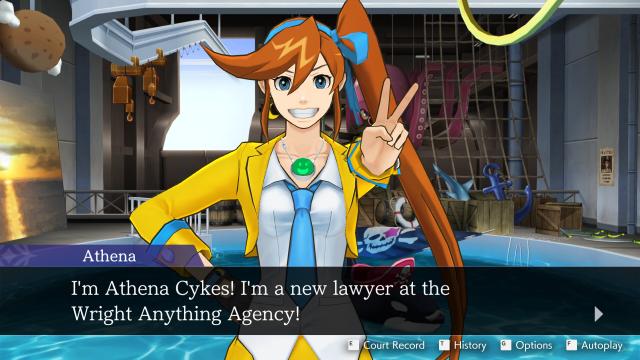
The bright side is that the moment-to-moment writing in most of these games is usually very well-crafted, and the dialogue between characters is enjoyable and natural-sounding. Phoenix, Apollo, and Athena all have their own unique quirks that make them stand out, and the various prosecutors, detectives, and other side characters lend the world of Ace Attorney a wacky charm all of its own. Ace Attorney has always remain enjoyable, even during slower sections, by having characters that are just plain fun to watch, and this is one area where the… “Apollo Justice” games live up to, if not exceed outright, the quality of the older titles. Dual Destinies in particular is very strong on this front, with arguably the most entertaining prosecutor rival in the series, and I’ll admit that for as big of an absolute waste of time as Spirit of Justice’s fourth case is, it’s almost worth it just for the chance to hang out with him again.
Another area where this Ace Attorney Trilogy arguably improves over the Phoenix Wright Trilogy is in terms of difficulty. There are fewer instances of annoying gimmick penalties (think being penalized for Moe making bad jokes in the original) and the logic does generally flow better, so there aren’t as many instances where the player is expected to make a huge leap in logic. The cost is that there are a few instances where they lean a bit too heavily on hinting the player towards the correct answer, but I think this is one of those instances where I’d prefer erring on the side of caution rather than putting the player in a scenario where they have to just guess randomly. Another welcome change is that the modern saving system from Dual Destinies and Spirit of Justice – where the player doesn’t have to exit back to the main menu in order to record their progress – has been implemented in Apollo Justice as well, making things a little bit less annoying.
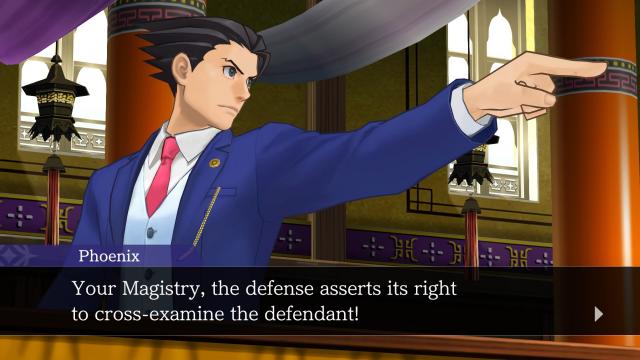
Which brings us to what’s actually changed from the original versions of these titles. The visuals are the biggest alteration, at least for Apollo Justice. If you haven’t played these games before, you might be surprised to see the visuals change from sprite work to 3D models between Apollo Justice and Dual Destinies, and that’s in no small part due to the six year gap between the original releases. Apollo Justice’s sprite work has been touched up and beautified, and after having to look at the bizarre featureless faces from the panned out shots of the courtroom in Phoenix Wright: Ace Attorney Trilogy, it’s very gratifying to see detailed people populating the benches, rather than the amorphous blobs that were present in the original trilogy’s re-release. The zoomed out shots look almost like impressionist era paintings now, and it has a very nice touch to it.
The flipside is that Dual Destinies and Spirit of Justice don’t see quite the same level of improvement. The 3D models look pretty much exactly like they did, save for improved resolutions to fit a larger screen. This isn’t so much a complaint as it is just an acknowledgement; I think the models are absolutely fine substitutes for sprites, and allow for animations that would have been probably impossible to pull off with sprites, particularly with some of the more dynamic witnesses. Just know that the same leap that Apollo Justice sees in terms of visual quality won’t be present for the other two titles in the collection.
Switching notes slightly, some of the weirder changes are the limited adjustments made to achieve audio consistency across the series. Given the six year gap between Apollo Justice and Dual Destinies, changes in voice actors was something of an inevitability. This led to some characters sounding very different for games that, chronologically at least, only took place one year apart. Capcom has gone back and attempted to adjust for this by replacing some, but not all, of the character voices in Apollo Justice with their equivalents in Dual Destinies. For instance, Ben Judd’s voice recordings for Phoenix Wright’s courtroom lines in Apollo Justice have been replaced by Sam Riegel’s voice work from Dual Destinies, while JP Kellam’s recordings of Apollo’s lines in Apollo Justice remain, instead of being replaced by Orion Acaba’s voice work. It’s also odd that, out of all the characters to be adjusted in this manner, Klavier Gavin was not one of them, given that Andrew Alfonso and Yuri Lowenthal’s takes on him don’t even sound remotely similar to each other.
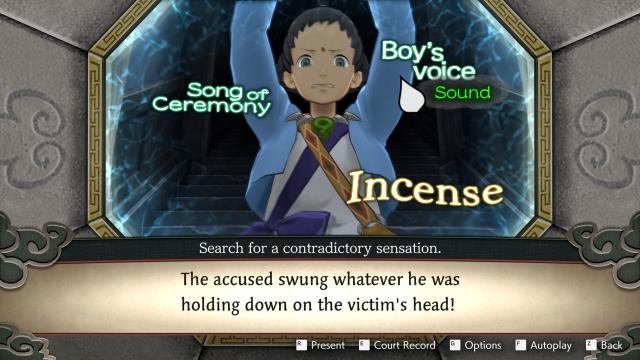
Rounding out the Trilogy are some extra features. There are some cosmetics for the main cast that existed in the previous games, an art/cut scene library, soundtrack, and probably most uniquely, an animation studio that allows you to rearrange the various models and backgrounds to create your own images, which I’m sure will most certainly not be used to make the creepy doctor inappropriately touch the rest of the cast. There’s also a story mode, where the game basically plays itself, choosing all the right places to investigate and the correct pieces of evidence to present… y’know, in case you haven’t heard of gameplay walkthroughs on YouTube or something.
And despite my rather tepid reception to the stories (particularly those in Apollo Justice and Spirit of Justice), I will give credit where credit is due: the extra features are a fantastic addition. Including concept art as a freebie is always great, especially when it’s art that was previously exclusive to Japanese artbooks. I’m also a big fan of letting players customize menus after beating the game for the first time, and this Trilogy has no shortage of customization options to choose from. The music and animation editors are less of a draw for me, as I don’t really intend to carry my Switch around to listen to music, and green screening video game characters is a short-lived novelty for me, but they’re good features to have for those who are so inclined.
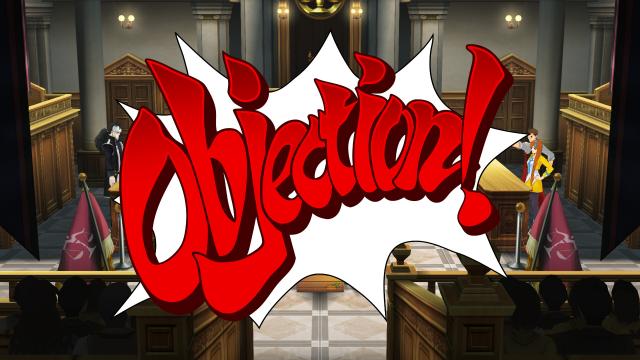
Overall, Apollo Justice Trilogy is the best way to experience three games with a somewhat controversial legacy within the series. So the question is whether they’re worth experiencing, and the answer is probably yes if you enjoyed the original trilogy and haven’t played these titles yet. Fans who have already played them probably won’t find enough in this package to warrant a second purchase, unless they feel really attached to the narratives, but personally revisiting these stories left me annoyed at the missed potential of the first and third titles in particular. In the end, Apollo Justice Trilogy stands as a warning for why it’s important to plan out your narratives; or, at the very least, avoid kneecapping yourself at the starting line by restricting one of the greatest strengths of your series due to fear of isolating new players.
This review is based on a digital copy of Apollo Justice: Ace Attorney Trilogy for the NS
More Articles